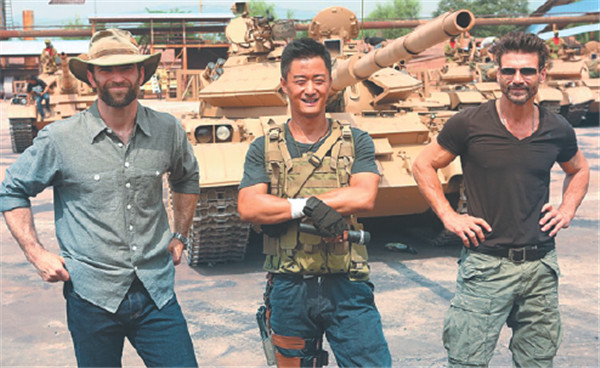 |
|
Wu Jing (center), director and leading actor of Wolf Warrior II, with Italian-American co-star Frank Grillo (right) and American stunt master Sam Hargrave at a filming site. [Photo provided to China Daily] |
If Hollywood hears a wolf at the door, it may well be Chinese director-producer-star turned wolf-pack leader, Wu Jing, whose recent effort, Wolf Warrior II, has gobbled up the competition to become a genuine cultural phenomenon, not only in China but also for Hollywood.
Some critics have been shocked by the film's box-office performance. It has raked in $650 million since July 28 to last weekend in China alone.
Film Journal International contends that's because "Wolf Warrior II is like a propaganda movie, with Leng even unfurling a Chinese flag at one point to assure safe passage through a war zone".
But many critics shrugged off the idea.
Rotten Tomatoes.com only gave the movie a 50 percent on its "tomatometer", while it scored 88 percent on their audience-approval score.
"Like Sylvester Stallone before him, and John Wayne before Stallone, star Wu Jing has successfully exploited the crowd-pleasing potential of enhancing militaristic action-adventure heroics with a heavy dose of flag-waving patriotism," Variety says in its report about the movie, published on Aug 11.
"The big difference here, of course, is that the flag waved by Wu and others in this shoot-'em-up extravaganza is that of the People's Republic of China and Wu's heroic Leng Feng is not a Green Beret but rather a once-and-future member of his country's elite Wolf Warriors special-ops unit," the report says.
Italian-American co-star, Frank Grillo, who compellingly plays the blood-thirsty mercenary antagonist, Big Daddy, rebuts the accusation as well.
"It's Chinese nationalistic-not propaganda. It's no more propaganda than Rambo."
Grillo, best known for his portrayal of famed Marvel comic book character, Crossbones in Disney's blockbuster Captain America franchise, sings Wu Jing's praises in an interview.
"He's a special man, who's got his finger on the pulse of what politically and emotionally charges his country. He understands China's zeitgeist."
Wu also dismisses this criticism, while readily admitting his film is "a combination of a commercial action movie and a Chinese military propaganda movie".
During a recent news conference, he angrily retorted: "Why is that a problem? America makes movies that promote the American spirit. Why can't I do that for China?"